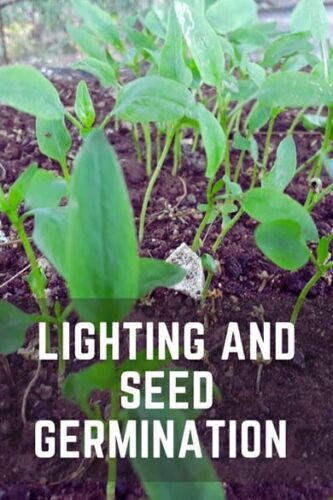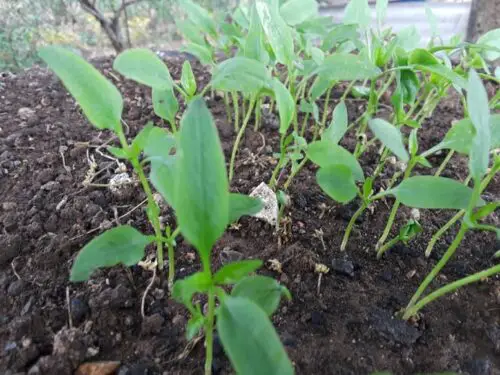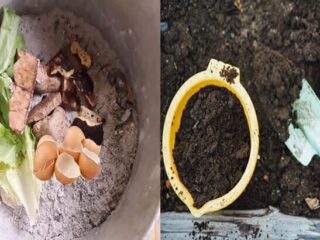How does light affect seed germination?
Germination usually takes place when seeds are sown underground, so the light wouldn’t affect them much.
However, since light does not reach the plant seed, what matters is warmth and moisture around the seed.
So, when the plant seed senses that there is enough water to sprout while the temperature is right, it will germinate.
If they do not germinate, they will stay dormant until environmental conditions are suitable.
Nevertheless, some seeds require a period of cool or cold weather, while others only need their seed coat to be weakened, etc.
However, in general, lighting and germination are not major players in seed germination. It plays a better role when the seed sprouts upward.
But if the lighting is used for heat, for example, in a greenhouse nursery, then heat from the light will play a major role in seed germination.

How Does Light Affect Seed Germination?
Does light affect plant seed germination?
Some plant seeds need light treatment to assist them with germination, while others can cope with just a brief exposure to light rather than being in the dark.
Other plant seeds do not germinate well if exposed to light; others don’t mind either way. So, it depends on which species of plant you are considering germinating.
Is sunlight needed for germination?
While most seeds can germinate in a container of water in which sunlight is able to reach the seed,.
Sunlight is not a requirement for seed germination. On the other hand, sunlight might hurt a seed’s ability to germinate by making the seed’s environment too warm for growth.
Why?
Well, this is because seeds need lots of water to germinate. Sunlight can dry up any water around the seeds, making them dormant again.
You can germinate seeds indoors, almost in the dark, during the winter if you live where the temperature is cold.
However, so long as the seeds are in a warm spot, like a window ledge where a heat vent is located or in a greenhouse window, most seeds will germinate in a wet and warm environment, like a paper towel.
A lot of people start sowing seeds inside during the winter to get a head start on planting.
Once the cotyledon leaves have sprouted upward, your seedling needs light to continue its growth.
How can seeds germinate in the dark?
When it comes to darkness and germination, not all seeds germinate well in the dark.
Some require lots of light and will just lie dormant until brought to the surface.
Plant seeds that require darkness need a certain amount of compost over the top of them to help retain moisture while they develop.
Nevertheless, if they’re lucky enough, this is not too much to prevent them from reaching the soil surface before they run out of reserves from the seed.
Do seeds require light and/or heat for germination?
In a situation where heat and lighting are required for termination, it depends on the seeds.
Some plant seeds certainly need light to germinate.
These tend to be flower plant seeds that are either very tiny or wind-born, such as poppy, geranium, or impatiens.
Peppers like Moruga Scorpion or Carolina Reaper are examples of seeds that like to germinate with warmth at 75 to 78 degrees F.
Other seeds like to be in the dark and at room temperature for germination.
Not All Plant Seeds Germinate The Same
Germination can be complicated at times for some plants, such as berries, trees, bushes, and even some vegetable crops.
Some plant seeds need chilling and exposure to temperatures below normal before they will show signs of germination.
Other seeds need scarification. A general term for scarification is the process that weakens or damages the outer seed coat, such as scarring, boiling, or light chemical treatment.
When it comes down to chilling and scarification, the natural cause of damage that occurs is when the seeds pass through an animal’s stomach or when it undergoes repeated cycles of freezing and thawing during the winter.
What’s the best way to germinate seeds?
Most garden plant seeds just need some water, some warmth, some soil, and then some light, and they will germinate fine.
However, some plant seeds need darkness, while others need more light, and others need to be scratched.
The time it takes peony plant seeds to germinate takes 4 – 8 months. Some even need to go through fire to germinate.
Germination in plants’ needs is nearly as diverse as the world itself.
However, with that said, moderate and moist soil or seedling mix plus warmth between 65 and 85 Fahrenheit, and then plenty of light once they sprout up will do well for almost all common garden plants.
The Easiest Way to Germinate Seeds
Covering seeds you have sown with a lid or plastic wrap helps them build up warmth so they germinate well. After signs of sprouting, remove the plastic lid cover, or they could start to rot in the overhumid environment.
The windowsills probably won’t have enough light to grow your seeds once they have germinated.
However, if you are sowing seeds indoors, consider investing in a grow light.
Afterward, take your young germinated plants outside to a sheltered location in partial transition to full sun on every day that is above 60 degrees Fahrenheit, and take them back when temperatures drop again.
Nevertheless, outdoor daylight is many times brighter than even growing bulbs, which in turn are much better than a windowsill altogether.
The more light you can allow your plants to access once they are germinated, the better.
How to Plant and Germinate Seeds?
The best way to plant and germinate seeds is to sow them about four times their diameter. Tiny seeds like celery or pok choy can be liberally sprinkled on top of the soil, and a big seed like sweet corn is two inches deep.
Nevertheless, seeds with hard coats, such as beans, peas, or sweet corn, will germinate faster if they’re soaked overnight.
Another way to germinate seeds quickly is to place seeds between folded, moist paper towels. Transplant them when they sprout.
Some plant seeds, like the ”Morning Glory”, benefit from nicking or scarring with a metal file.
Wildflowers such as bluebonnets need to be sown directly in the ground during the fall. They need some cold temperatures before they’ll sprout in the spring.
A lot of experimentation and experience in your local climate will yield the best results. I hope this post explains how light affects seed germination, and has helped to answer your question.
Keep Growing and Gardening!




